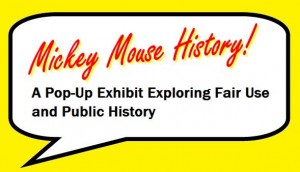Imagining a future for historic house museums, Part 2
20 May 2015 – editors 2
Tag Archive
20 May 2015 – editors 2
18 May 2015 – editors
methods, public engagement, sense of place, interpretation, The Public Historian, historic house museums
12 May 2015 – Rebecca Keller
Editor’s note: This piece is part one of a special online section accompanying issue 37(2) of The Public Historian, guest edited by Lisa Junkin Lopez, which focuses on the future of historic house museums. The contributions in this section highlight the voices of artists who engage with historic house museums as sites of research, exhibition, and social practice. Read More
09 April 2015 – Dan Kerr 1
advocacy, methods, social justice, community history, publicity, collaboration, human rights, gentrification, politics, conference, ethics, Hardball History
On May 30, 1995, wearing an orange construction helmet, I stood behind a makeshift barricade on E. 13th Street in New York City. Hundreds of squatters faced off against larger numbers of riot police who were armed with a tank and supported by snipers on the surrounding buildings. Read More
08 April 2015 – Julie Rogers
 Public historians rely on images, audio, and film to engage the public and interpret the past. But almost every professional has experienced confusion over copyright restrictions or faced expensive licensing agreements. Some of us may get by with using images from the public domain, but many historical images remain under copyright. Read More
Public historians rely on images, audio, and film to engage the public and interpret the past. But almost every professional has experienced confusion over copyright restrictions or faced expensive licensing agreements. Some of us may get by with using images from the public domain, but many historical images remain under copyright. Read More
01 April 2015 – Michelle Hamilton
In 2011, the Professional Development Committee developed a set of guidelines for annual meeting workshops. We see workshops as providing hands-on and participatory experiences which impart practical information, rather than the typical conference presentation or “show and tell” case studies. With these guidelines in place, the committee has begun to think about a broader curriculum of professional development opportunities to serve the needs of National Council on Public History members. Read More
30 March 2015 – Robert Pomeroy
Some nineteen categories of public history programs are now offered. Many offer skills and knowledge useful for specialized businesses (archival practices, business histories, publishing). None prepare history students for general business careers. Business and History is designed to fill this void by linking historians’ methods to solving problems common to private enterprise. Read More
25 March 2015 – Cathy Stanton 2
advocacy, methods, social justice, public engagement, profession, politics, conference, ethics, Hardball History
To borrow Shakespeare’s phrase, some public history work is born political, some becomes political, and some has politics thrust upon it. Whether we intentionally locate ourselves in controversial settings, have something blow up in our faces, or encounter less spectacular kinds of resistance or misunderstanding, we’re always on the edge of the political, even when we don’t set out to be. Read More
13 March 2015 – Suzanne Fischer 3
Doing public history, in all its diverse manifestations, requires certain specialized habits of mind. One of the most vital but also the most mysterious is synthesis.
When I begin work on an exhibition, such as the one I’ve been developing for the past two years, I read as many books and talk to as many people as I can, and then–I wait. Read More
11 March 2015 – Ellen Arnold 1
At Ohio Wesleyan University, I teach an upper-level medieval history course, “Constantine to Charlemagne.” This is an undergraduate class, with 18 students of varying backgrounds. The course addresses a time period (ca. 300-850) often slandered as barbaric and backwards, so my goal is for students to see the richness, texture, and vibrancy of the period along with the political and economic troubles that befell certain areas. Read More